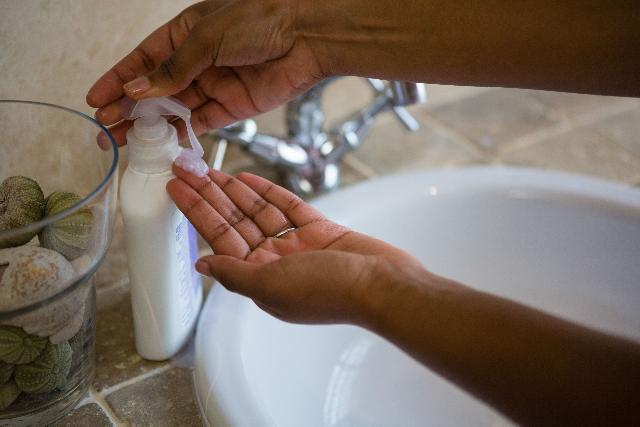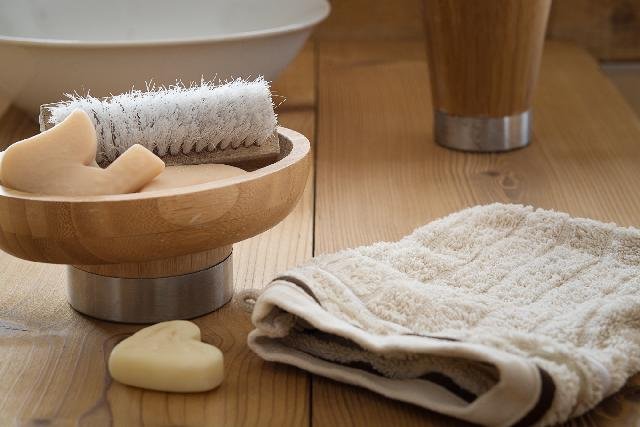Last Updated on August 6, 2023 By Emma W. Thomas
Using hand soap as dish soap is not recommended. Hand soaps may contain ingredients that can be harmful if ingested or leave a residue on dishes. Stick to using dish soap specifically designed for cleaning dishes to ensure safety and effectiveness.
Can You Use Hand Soap As Dish Soap?
Cleaning dishes is one of the most essential aspects of maintaining hygiene at home. So when we run out of dish soap, the question arises – Can we use hand soap instead? Here is a comprehensive look at the topic:
1. Composition Difference
The primary difference between dish soap and hand soap is the composition. Dish soap is designed to cut through food residue and grease while being gentle on the hands. Hand soap, on the other hand, is formulated to clean and soften skin. The ingredients for both, thus, differ significantly.
2. Efficiency Levels
Hand soap may not strip away grease or food remnants as effectively as dish soap due to its different composition. While it might get rid of some dirt, it’s not as thorough as dish soap.
3. Possibility of Residue
Hand soap may also leave a residue on dishes, which could potentially be ingested. Some hand soaps contain moisturizing agents that are not ideal for ingestion.
4. Difficulty in Rinsing
Hand soap is designed to lather and foam more than dish detergent. As a result, it might be difficult to rinse off completely from dishes, leading to a waste of water.
5. Skin Irritation
Although hand soaps are designed to be mild on hands, frequent or prolonged exposure can cause skin irritation or dryness. Washing many dishes with hand soap can thus be harsher on the skin than using dish soap.
While it’s technically possible to use hand soap as dish soap, it’s not recommended. The composition, cleaning efficiency, potential for residue, difficulty in rinsing, and impact on skin and environment all favor dish soap for washing dishes. Stick to each soap’s intended use for optimum results.
What Is The Difference Between Hand Soap And A Dish Washing Detergent (Dish Soap)?

Soaps are milder in nature, especially hand soaps, and they form a better foam when infused with warm water. They need to be rinsed several times with clear water to avoid any sort of residue which may be left. Soaps don’t do well in hard water; they just form into a scrum and fail to do a good job at cleaning anything. They need warm water to work well.
Whereas a detergent-like dish soap, in this case, can tackle any level of water hardness. They do an excellent job of cleaning whatever it meant to clean, depending on the type of detergent you are using. They are heavy-duty in nature, for lack of a better term, and most importantly, they do not leave any residues compared to normal soaps.
Here Is A Comparison Table Distinguishing Between Soaps And Detergents.
| Normal Soaps (Hand Soap) | Liquid Detergent (Dish Soap) |
| Works well only in soft warm and soft water. | Works like a charm in any level of water hardness and any kind of temperature. |
| Leaves residues of some sort and requires to be rinsed many times with clean water to get rid of it. | Milder cleaning agent and is suitable for skin. |
| Milder cleaning agent and suitable for skin. | Purpose made for specific items and in this case, to wash dishes, they are strong cleaning agents and cuts down on any debris, impurities, and waste. |
| Made from natural ingredients. | Made from chemical formulas and synthetic material. |
Can You Use Laundry Detergent to Wash Dishes?
The household chore of washing dishes is commonly performed by using specific dish detergent or dish soap. However, not everyone always has access to these items, resulting in the consideration of alternative solutions. One question often posed is: Can you use laundry detergent to wash dishes? This listicle explores this idea while offering insights into the safety, efficacy, and potential drawbacks of using laundry detergent to clean your dishware.
1. Chemical Composition of Laundry Detergent
Laundry detergent is typically tougher and contains stronger chemicals than dish soap. It’s designed to remove stubborn fabric stains. Although highly effective for laundry, these strong chemicals may not be ideal or safe for washing dishes.
2. Potential Health Risks
Laundry detergents are not meant for direct consumption. Accidently ingesting traces of the detergent left on dishes may lead to a variety of health risks, including nausea, stomach upset, or more severe issues.
3. Impact on Taste
Laundry detergents can leave a chemical residue that might directly affect the taste of food. Even after rinsing, the residue can remain, altering the flavor of food served on the cleaned dishes.
4. Damage to Dishes
Laundry detergent might harm certain types of dishware. Certain fine china, delicate glassware, or non-stick pots and pans could be at risk of damage due to harsh chemicals not normally found in dish soap.
5. Environmental Impact
The strong chemicals in laundry detergent can be harmful to the environment if not properly treated before being discharged into wastewater. In contrast, dish soaps are often formulated to be more environmentally friendly.
6. Effect on Dishwasher
If one is considering the use of laundry detergent in a dishwasher, it’s important to note that the high suds production can damage the machine. Dish soaps are formulated to produce the right amount of suds for dishwashers.
7. Lack of Sanitizing Properties
While laundry detergents excel at removing stains, they are not formulated with the same sanitizing properties as dish soap. Using them to wash dishes might not adequately remove bacteria and food particles.
After a comprehensive examination of the question, it becomes clear that using laundry detergent to wash dishes is not recommended due to reasons regarding health risks, potential damage to dishes and dishwashers, environmental impact, and its lack of specific sanitizing properties. It’s always best to use products as intended by the manufacturers, and in this case, opt for dish soap or detergent when washing dishes.
So, Does A Bar Of Soap Work?
If at all you’re in a place to absolutely resort to bar soaps, you might as well do so, only for about a few emergency washes. But since it’s bar soap, you’d often find it extremely difficult to wash the dishes if they’re huge in numbers. With bar soap, you do not have the ease of going fast like liquid soaps since they’re generally manufactured to cut grease. Also, they come with strong scents that you’d surely not like to experience during your next supper. So even if it comes in handy for a handful, it might take you on a hectic roll once you start using them for heaps of soiled dishes in your sink.

Aren’t There Any Alternatives At All To Dish Soaps?
Are you stuck in a dire situation of having run out of dish soap? And there are guests coming over? And you’ve absolutely no time to take a trip to the grocery store? Worry not, for we’re here to cover for you. In cases like these, just head over to your kitchen and grab your Baking Soda. Yes! You read that right. Baking soda is the best alternative to dish soap. This being, very a staple in every kitchen, serves handy during emergencies. They absorb a good amount of grease, that when fused with water, makes a lather paste that helps you get rid of food debris.
Directions To Use Baking Soda as Dish Washer:
- Wear rubber gloves while using baking soda.
- Take ½ cup of baking soda
- Mix in a few tablespoons of water to the baking soda to form the paste.
- Make sure you’re using it to rinse with the hottest water that’s possible in order to disinfect.
- Try getting the dishes air-dried.
Ways To Use Vinegar Mix As your Dishwasher:
For a stronger mix than that of baking soda and water, add a few drops of white vinegar to your paste for a richer lather. Smear your dirty dishes with the lather to work well on them. Rinse them off really well to help them get devoid of all sorts of grease or food bits.
Vinegar mix works like magic and can serve as a wonderful alternative to dish soaps. So, the next time you’re stuck with no dish soap at home, you can definitely give this makeshift soap a try. If you have your last exhausted dish soap bottle left, use it here.
- Pour your vinegar mix and baking soda into the bottle,
- Add a small amount of water and
- Stir it all up to get it all mixed with the little layer of soap left in the bottle.
It’d surely be an added bonus to the cleansing effect.
Conclusion
Finding an alternative in hand soap to dish soap is a BIG no-no. Hand soaps contain antibacterial and antifungal agents and components which sure can sanitize your dishes, but they often come with additives, which absolutely aren’t safe for food. Experts have been dealing to resolve the dilemma between using hand soaps and dish soaps for a long and have been trivially divided into two segments vouching for the two alternatives. Even though for emergency purposes soaps can still be used if you don’t have anything available with you at that moment, you have to be more cautious and use clean warm water in an effort to thoroughly rinse out any residue left of the soaps. We recommend that even if you don’t have the proper dish wash, just go buy a cheap one, it still works better than soaps and is much safer.
References:
https://www.dropps.com/blogs/spincycle/can-you-wash-dishes-with-hand-soap
https://www.apartmenttherapy.com/can-you-use-hand-soap-to-wash-dishes-266744
Emma is a graduate of Domestic Science or Family and Consumer Sciences (Home Economics) from the University of Wisconsin. She has 7 years of experience Working with the strategic section of BestBuy and now writing full-time for Homeeon.
From Managing the Home, Interiors, Cleaning, and Exteriors to Gardening and everything about Making A Home Liveable – is her passion and this Homeeon is the result of this.
Emma loves decorating her home with the best stuff found online. She cares about quality over anything and writes reviews about them here in Homeeon. Get in touch with her over Pinterest.
Keep reading her blogs.